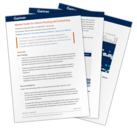Artificial intelligence (AI) refers to the branch of computer science dealing with questions regarding the automation of intelligent behaviour and intelligent decision-making.
The foundation of AI is the development of self-adaptive software. In this context, 'self-adaptive' means that the software does not simply follow previously defined algorithms, but varies and refines them as appropriate for the tasks and problems.
With regard to objectives and questions, science distinguishes between strong and weak artificial intelligence. Strong artificial intelligence is designed to copy and mechanise intelligent human behaviour. Related questions here also address the possibility of machines achieving self-awareness.
Research on weak artificial intelligence, on the other hand, is more practice- and application-oriented. The object here is to master concrete tasks, such as those typical for logistics.
Logistics 4.0
Artificial intelligence is already being used in various areas of logistics. It is ideal for use wherever predictions have to be made (see also: predictive analytics) or efficient planning is required. Such software can, for example
- predict order volumes and calculate the human resources, vehicles and equipment needed to fulfil the order.
- adapt route planning to the volume of traffic in real time.
- identify processes and machines that are susceptible to errors or faults and generate proposed solutions.
- analyse all warehousing activities and propose optimisations.
- review staff behaviour and suggest improvements.
- incorporate current market conditions into the analysis of consumer behaviour.
All in all, artificial intelligence should give Logistics 4.0 important impetus toward transforming previously reactive processes into proactive processes, which, to put it bluntly, would mean that a customer's order is already on its way before they even know what they need.
First steps on the consumer side: Smart home and voice assistants
However, the proactive behaviour as is theoretically possible with AI also requires a high level of acceptance on the part of consumers. This can already be observed where the Internet of Things is used to set up smart homes or voice assistants facilitate ordering processes.


